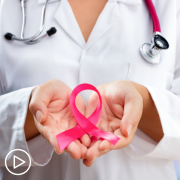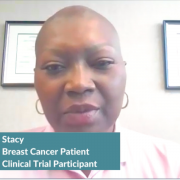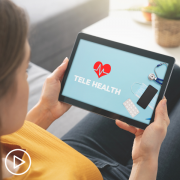Breast Cancer Before 40: What You Should Know
Breast Cancer Before 40: What You Should Know from Patient Empowerment Network on Vimeo.
Dr. Stephanie Valente reviews key information for women under the age of 40 with breast cancer, including risk, treatment approaches and the role of genetic testing.
Dr. Stephanie Valente is the Director of the Breast Surgery Fellowship Program at Cleveland Clinic. More about this expert here.
Related Program:
Transcript:
Sure. So, when we talk about breast cancer in young women, usually we are referring to women under the age of 40. And the prevalence for breast cancer in general is one out of eight women. For women under the age of 40, it’s about a seven percent incidence of breast cancer. So, it’s about a seven percent incidence in the general population in the United States. So, that’s about 12,500 women per year are diagnosed under the age of 40 with breast cancer.
So, the prevalence has pretty much been the same over the years. We used to think that women diagnosed at a younger age had a more aggressive breast cancer. But the more we look at things, the more we realize that women under the age of 40 usually are diagnosed at a later stage because it’s not something that somebody in their 20s or 30s is thinking that a breast lump equates to cancer. So, these women unfortunately present at a later stage.
Many times, it’s because they are pregnant, breastfeeding or just not having any family history where the first thing they think of when they get a lump is that they actually have breast cancer.
So, the first thing is women under the age of 40 usually present at a later stage, meaning that they have larger cancers, and the cancers because they are larger have had more time to spread to the lymph nodes. So, these women they don’t necessarily have more aggressive breast cancers than older women, it’s just that it’s found at a later stage.
So, the treatment options are the same for young women with breast cancer. So, depending on the size of the tumor and the size of her breast, women are given the option for a lumpectomy which usually is follow by radiation versus a mastectomy. And studies have shown that either surgical choice is a good option for women. And that one surgery doesn’t make a young woman, or an older woman live any longer.
That the survival for breast cancer is based on stage not the choice of surgery that they pick.
So, one of the first things is that women under the age of 50 – the average age for breast cancer in the United States is between 64 and 68.
So, if you are under the age of 50 or under the age of 40 there’s a higher chance that maybe these women carry a gene that would increase the risk of getting breast cancer. And so nowadays, we test over 21 genes. But these genes can increase their risk of getting breast cancer not only in the breast they have the breast cancer in, but in their other breast as well. It also increases the risk for other types of cancers such as ovarian cancer. And they could potentially pass this gene on to their kids.
So, sometimes women – and this is the great thing about academic medicine. Everything is changing so quickly with the modern research. So, a lot of times a woman who is triple negative, which is an estrogen receptor negative breast cancer.
If they are genetic positive for the BRCA gene, they qualify for certain medications or chemotherapy that we know targets specifically that type of cancer and their gene. So, that’s why it is important for some of these women to get genetic testing to see if the certain chemotherapy regimens or medicines that we have would benefit their type of cancer.
So, one of the things for any woman diagnosed with breast cancer at a young age is to offer those women genetic testing. And sometimes it can be a relief or sometimes it can be very challenging for these women to think, “Oh my gosh. I have this gene. I’m at increased risk for more cancers.” And that potentially they could pass that on to their children.
So, having the women who come in meet with a genetics counselor to go over the risks. And the reality is that of all the women under the age of 50 that test for the gene, only 10 percent actually carry the gene.
So, the good thing is that 90 percent most likely don’t have the gene. But it still is an anxiety provoking thing for these women to go through.
Another thing is that these women a lot of times are younger. So, they have either two things – young children to take care of which is extremely difficult to mange an already stressful motherhood. You throw in a diagnosis of cancer, whether or not there is a dad involved or a father that needs to help out with these kids. A lot of times their families need to help out. So, we have a psych oncologist that’s part of our team. And it’s really great. How do you tell your kids you have cancer? And how do you manage kind of day-to-day life with going through this? So, that’s another great program that is offered. And importantly for a woman who doesn’t have children but maybe desires to have children or even to have more children than the ones that she has,
looking at fertility options for young women is huge.
So, we know that some of the chemotherapy that we give breast cancer patients decreases their ability to have children in the future. So, the chemotherapy can shut down the ovaries. So, sometimes women – and this is the great thing about academic
medicine. Everything is changing so quickly with the modern research. So, a lot of times a woman who is triple negative, which is an estrogen receptor negative breast cancer.
If they are genetic positive for the BRCA gene, they qualify for certain medications or chemotherapy that we know targets specifically that type of cancer and their gene. So, that’s why it is important for some of these women to get genetic testing to see if the certain chemotherapy regimens or medicines that we have would benefit their type of cancer.
So, the one thing is that I tell these women that breast cancer takes a good year between chemotherapy if they need it, surgery, radiation of they need it and the whole process of recovery. That is really takes a good solid year before they are kind of done going to their doctor’s appointments. But the reality is that for an early stage breast cancer, studies have show for young women the overall survival is over 92 percent. So, I say, “This is going to be a tough year. We are going to get through this together. And the good thing is that you are going to be alive in five, 10, 15, 20 years. And so, our goal is to get you the best quality of life not only now but in the future.”
As far as hope for young women with breast cancer, things are changing so fast. The medicine that’s out there – we’re doing these studies where women are getting chemotherapy and by the time they get to surgery about 40 to 60 percent of the tissue that I take out has no residual cancer. That’s phenomenal. That means that the medications that these women are getting are working really well for their cancer. And so, the hope is that in 10 years I don’t have a job because the medicine that they are getting works so well that the cancer can be removed without needing surgery. And so, I think in our lifetime we will find either a cure or a complete resolution of breast cancer.










